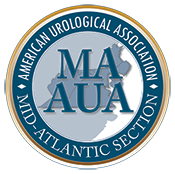October 2019 - AUA Public Policy Council Update for MAS
From the Chair
 I am pleased to share updates from the AUA Public Policy Council that may benefit your Section members. Our updates include information on the AUA’s and Urology Care Foundation’s successful Bladder Health Alliance Roundtable as well as the AUA’s comments on the Centers for Medicare & Medicaid Services 2020 proposed rules for the Medicare Physician Fee Schedule and the Hospital Outpatient / Ambulatory Surgical Center Prospective Payment System.
I am pleased to share updates from the AUA Public Policy Council that may benefit your Section members. Our updates include information on the AUA’s and Urology Care Foundation’s successful Bladder Health Alliance Roundtable as well as the AUA’s comments on the Centers for Medicare & Medicaid Services 2020 proposed rules for the Medicare Physician Fee Schedule and the Hospital Outpatient / Ambulatory Surgical Center Prospective Payment System.
AUA Convenes More Than 25 Patient, Physician, and Research Advocacy Organizations at Bladder Health Alliance Roundtable Meeting

On October 2, the AUA and the Urology Care Foundation hosted a successful Bladder Health Alliance Roundtable meeting that brought together more than 25 patient, physician, and research advocacy organizations. Advocates convened for a full-day meeting to discuss topics including innovative bladder health research programs taking place at the National Institutes of Health; collaboration opportunities for promoting policies that reduce stigma associated with bladder health conditions and improve bladder health behaviors; how advocates can become engaged with the Patient Centered Outcomes Research Institute (PCORI); and the current federal research funding landscape and how advocates can best engage with lawmakers to protect funds for urologic research. Read more here.
AUA Comments on 2020 Proposed Fee Schedule
The AUA submitted comments to the Centers for Medicare & Medicaid Services (CMS) on the 2020 proposed rules for the Medicare Physician Fee Schedule (MPFS) that includes updates to the Quality Payment Program, Open Payments and other Medicare Part B policies on September 24, 2019.
Highlights of the AUA’s recommendations include the following:
- Evaluation and Management Service Changes
- AUA supported CMS’ proposal to implement the revised E/M code definitions developed by the AMA CPT Editorial Panel earlier this year that have an effective date of January 1, 2021 and not implement the consolidation of E/M codes as planned.
- AUA supported CMS’ proposal to retain separate payment for individual E/M services as revised by the CPT Editorial Panel, including the adoption of values for the new patient outpatient service office visit CPT codes (99202-99205) and established patient outpatient codes (99211-99215). Eliminate CPT code 99201.
- AUA supported CMS’ proposal to adopt all of the RUC-recommended work RVUs and times for the revised code family and new prolonged add-on code
- AUA opposed, along with the AMA and other specialty societies, CMS proposal to reject the RUC’s recommendation to apply the outpatient E/M visit increases to 10- and 90-day global services.
An easy reference guide to our MPFS comments – including our position on proposed values for urology codes– is now available on AUAnet.org.
The AUA also commented on the Hospital Outpatient / Ambulatory Surgical Center Prospective Payment System (HOPPS).
Highlights of the AUA’s recommendations include the following:
- 2020 Device Pass-Through Payment for AquaBeam® System: The AUA stated that the AquaBeam System met all the necessary criteria for Transitional Pass-Through Payment Status, including criteria for establishing a new device category and recommended that AquaBeam should be awarded Transitional Pass-Through Payment Status effective January 1, 2020.
- Ambulatory Payment Classification (APC) Assignment for New CPT Code 55854 Transurethral Destruction of Prostate Tissues; by radiofrequency generated water vapor thermotherapy: The AUA requested reconsideration of the assignment of CPT code 53854 to APC 5374 instead of the current APC 5373. The AUA stated that the final APC assignment of CPT code 53854 to an APC with a significantly lower payment rate than the two other similar BPH treatment codes seems inappropriate.
- Ambulatory Surgical Center (ASC) and Hospital Outpatient Reimbursement for Blue Light Cystoscopy with Cysview: The AUA urged CMS to improve access to this service in the ASC setting, particularly given that the Food and Drug Administration approved the procedure for administration with a flexible scope.
For more information regarding the AUA comments on the proposed rule for HOPPS, ASC and Quality reporting programs, read more here.
AUA Sends Collaboration Letter to State Urological Societies
On October 1, the AUA sent a letter to more than 30 state urological societies expressing the AUA’s ongoing interest in working together whenever possible, and highlighting the AUA’s interest in setting up a rapid response plan within each state. AUA currently is in the process of scheduling in-person meetings and conference calls with several state urological societies to discuss our prioritiesand to strategize on ways to partner in the future. The letter follows a similar letter to state medical societies sent earlier this year.
For a copy of the letter, please reach out to Andrea Oh at AOh@AUAnet.org. We will keep you updated as these conversations move forward.
The following insurance updates are from national carriers.
Aetna
Aetna has updated the Prior Authorization form for Provenge. They have revised it with the following changes to questions and required information:
- Added “will Provenge (sipuleucel-T) be used in combination with Xtandi (enzalutamide), Yervoy (ipilimumab) or Zytiga (abiraterone)?” as a question under the newly created “for all requests (clinical documentation required for all requests)” subsection.
- Added “What is the absolute-value increase between the 2 values?” as a question under the “for initiation requests only” subsection.
- Removed “will Provenge be used in combination with Xtandi (enzalutimide) or Zytiga (abiraterone)?” as a question under the “for initiation requests only” subsection.
- Revised the answer options to question regarding progression found on bone scan from “1 or more new lesions” to “2 or more new lesions” under the “for initiation requests only” subsection.
- Moved the following questions and required information under the newly created “for continuation requests (clinical documentation required for all requests)” subsection:
- Has the patient previously received any doses of Provenge?
- How many doses has the patient received?
- Please indicate all dates of infusion(s)
- Moved all existing questions under the newly created “for initiation requests only” subsection.
- Added “mail order” as required information under the “dispensing provider/pharmacy” subsection.
Anthem
Anthem has issued a reminder to physicians on their timely filing guidelines. Effective October 1, all contracted physicians with Anthem are required to submit all professional claims within 90 days of the date of service. This means claims submitted on or after October 1, 2019 are subjected to a 90-day timely filing requirement, and Anthem will refuse payment if submitted more than 90 days after the date of service. If the plan is the secondary payor, the 90-day period will not begin until provider receives notification of primary payor’s responsibility.
Oxford United Healthcare
Effective October 1, Oxford United Healthcare has updated its Office Based Procedures/ Site of Service medical policy. They have made the following changes to the policy:
- Simplified content
- Added language to indicate:
- Oxford members may choose to receive surgical procedures in an office setting or other locations
- Oxford is conducting site of service medical necessity reviews, however, to determine whether the ambulatory surgical center (ASC) is medically necessary, in accordance with the terms of the member’s benefit plan; if the ambulatory surgical center is not considered medically necessary, this location will not be covered under the member’s plan
- Revised medical necessity criteria for certain elective procedures performed in an ambulatory surgical center:
- Added criterion requiring:
- Developmental stage or cognitive status warranting use of an ambulatory surgical center
- Presence of complications and comorbid disease that would cause office based procedure to be unsafe or unsuitable
- Removed criterion requiring:
- Individual unable to cooperate with procedure due to mental status, severe anxiety, or extreme pain sensitivity
- Significant member comorbidities
- Removed language indicating some individuals may require more complex care due to certain medical factors or functional limitations and it may be appropriate to have the procedure in an outpatient hospital setting
UHC Community Plan
United Healthcare Community Plan has updated the Incontinence Supplies policy with the following revisions:
- Updated state exceptions to include the following quantity limits for North Carolina:
- 192 per month for HCPCS codes:
- T4521-T4524- Adult sized disposable incontinence products
- T4529-T4530- Pediatric sized disposable incontinence products
- T4533- Youth sized disposable incontinence products
- T4544- Adult sized disposable incontinence products, protective underwear/ pull on
- 200 per month for HCPCS codes:
- T4525-T4528- Adult sized disposable incontinence products
- T4531-T4532 – Pediatric sized disposable incontinence products
- T4534- Youth sized disposable incontinence products
- T4543- Adult sized disposable incontinence products, protective underwear/ pull on
- 150 per month for HCPCS code:
- A4554 – Disposable under-pads, all
Local and Regional Updates
The following are updates in your Section. Please contact AUA Executive Vice President Kathleen Zwarick at kzwarick@AUAnet.orgfor more information on any of these issues.
*A majority of state legislatures have adjourned for the remainder of 2019. Regardless, the AUA will continue to monitor state legislative, regulatory, and insurance issues that affect urology.
Pennsylvania
SR 202 – Urological Procedure Awareness
Senator Andrew Dinniman (D) introduced SR 202 recognizing September 2019 as “Prostate Cancer Awareness Month”. SR 202 recognizes the importance of raising public awareness of the threat and causes of prostate cancer.
The Senate adopted SR 202 with a voice vote on September 23. SR 202 is effective immediately. This resolution can be reviewed here: 9/23/2019 Version
SR 220 – Urological Procedure Awareness
Senator John Blake (D) introduced SR 220 to recognize October 5, 2019, as “Ostomy Awareness Day”. This measure also aims to increase public acceptance of ostomy surgery and continent diversion surgery and help the residents of the Commonwealth understand that ostomies are life-savers.
The Senate adopted SR 220 with a voice vote on September 23. SR 220 is effective immediately. This resolution is available here: 9/25/2019 Version
HR 464 – Urological Procedure Awareness
Representative Rosemary Brown (R) introduced HR 464 declaring September 2019 as “Polycystic Kidney Disease Awareness Month”.
The Pennsylvania House of Representatives adopted HR 464 on September 25. The resolution is available here: 9/5/2019 Version
Washington, DC
B 429 – Balance Billing
DC Councilmember Mary Cheh (D) introduced B 429, which bans balance billing for emergency services and for non-emergency services if the facility is in-network. This measure sets up an arbitration process to resolve disputes involving balance bills and requires the Department of Insurance, Securities, and Banking to report on the use of arbitration. B 429 also requires the Department of Insurance, Securities, and Banking to issue a consumer rights notice about balance billing and to enforce this measure.
B 429 has been referred to the Committee on Business and Economic Development. The bill is available here: 9/17/2019 Version
The following insurance update covers Delaware and New Jersey
Geisinger Health Plan has revised the Surgical and Minimally Invasive Therapies for the Treatment of Benign Prostatic Hypertrophy medical policy with the following changes to criteria, coding, and supporting information:
- Reformatted criteria. Combined the description and the indications sections.
- Added the following applicable procedures: transurethral incision of the prostate (TUIP), transurethral water vaporization of the prostate [e.g. Rezum] (TUVP), and transurethral enucleation of the prostate (TUEP).
- Added separate medical necessity criteria for prostatic urethral lift (UroLift), including the following:
- diagnosis of symptomatic benign prostatic hypertrophy (BPH) with duration of symptoms greater than 3 months; prostate gland volume is less than or equal to 80ml;
- prostate anatomy demonstrates normal bladder neck without an obstructive or protruding median lobe;
- therapeutic failure or intolerance to medical therapy (e.g. α1-adrenergic antagonists, 5α-reductase inhibitors); and
- absence of contraindications.
- Added the following CPT code:
- 0421T – Waterjet prostate ablation (non-covered for GOLD)
Horizon Blue Cross Blue Shield New Jersey has announced that, effective October 1, EviCore will conduct pre-service medical necessity determination reviews (MND). Among those reviews will be the following:
- 0113U – Oncology (prostate), measurement of PCA3 and TMPRSS2-ERG in urine and PSA in serum following prostatic massage, by RNA amplification and fluorescence based detection, algorithm reported as risk score
Horizon Blue Cross Blue Shield New Jersey has reviewed the Prostatic Urethral Lift medical policy and has made the following changes to criteria:
- Removed the following medical necessity criteria option for prostatic urethral lift:
- member does not have prostate-specific antigen level ≥3 ng/mL.
- Revised medical necessity criterion for prostatic urethral lift stating member does not have a contact dermatitis nickel allergy; added requirement of having no allergy to titanium or stainless steel.
ICYMI: Updates from the AUA Policy & Advocacy Briefblog
Medical Device Tax: AUA, 600 Groups Ask Congress to Repeal Tax
On September 24, the AUA signed a letter to House of Representatives and Senate Leadership requesting repeal of the medical device tax before the current suspension of the tax expires on December 31, 2019. The letter, sponsored by the Healthcare Leadership Council, was signed by 600 different physician associations, patient groups, hospitals, and other stakeholders, including AUA partners like the Alliance of Specialty Medicine, the Congress of Neurologic Surgeons, and ZERO – The End of Prostate Cancer. Congress previously suspended the medical device tax in 2015 and again in 2018. That suspension will sunset at the end of 2019, and could result in increased costs to patients for needed medical devices. The AUA has a longstanding history of supporting a permanent repeal of this harmful tax.
Part B Drugs Reimbursement Cap: AUA Signs Alliance of Specialty Medicine Letter
On September 30, the AUA —as part of the Alliance of Specialty Medicine— wrote Senate Finance Committee Chairman Chuck Grassley (R-IA) and Ranking Member Ron Wyden (D-OR) to express concerns about the impact of Section 109 of the Prescription and Drug Pricing Reduction Act (PDPRA). Section 109 would set a cap on the add-on payment for the physician reimbursement for the administration of Part B drugs.
Specifically, the letter points out that reducing physician reimbursement for acquiring, storing, handling, and administering Part B drugs will do nothing to reduce the prices of the underlying products. Additionally, reductions in the ASP add-on disproportionately harm small and rural practices, who already experience difficulty acquiring medicines at ASP. Read the Alliance letter here.
Surprise Billing: AUA Joins AMA Urging Fix to Surprise Billing
On October 11, the AUA and the American College of Surgeons, signed onto an American Medical Association-sponsored letter that was sent to House of Representatives and Senate leadership outlining concerns about the current legislative approaches for addressing the issue of surprise medical bills.
Specifically, the letter outlines the need for an independent dispute resolution process (IDR) that not only holds patients harmless, but is fair to both providers and insurers. While House legislation to address surprise billing includes an IDR, the letter provides ways in which it could be improved, such as:
- Lowering the $1,250 threshold to trigger an appeals process;
- Allowing for batching of claims that involve identical plans and providers and the same or similar procedures that occur within reasonable timeframes; and
- Ensuring that the initial payment of a median in-network rate is fair to all stakeholders in the private market.
Patient & Research Advocacy: Patient-Centered Outcomes Research Institutes (PCORI) Annual Meeting and Reauthorization Update
On September 18-20, the AUA attended the Patient Centered Outcomes Research Institute’s (PCORI) Annual Meeting. The meeting convened more than 1,000 members of the healthcare community, including patients, physicians, and researchers. Plenary and breakout sessions incorporated the meeting’s key theme, “Making a Difference: Using Patient-Centered Research Results in the Real World,” through engaging participants in meaningful discussions centralized around successful models of patient engagement. Key messages included the critical need for enabling patients to be empowered stakeholders to ensure research outcomes are useful and applicable in healthcare settings and ensuring the findings from PCORI research is translated into the healthcare system to improve patient outcomes. Learn more about PCORI and the research funded by their programs .
Prior to PCORI’s annual meeting, the AUA joined 40 PCORI advocates on Capitol Hill to meet with more than 40 Congressional offices to discuss the urgency for PCORI’s reauthorization. Specifically, the AUA met with the offices of Senators Chris Van Hollen (D-MD) and Ben Cardin (D-MD) and Representatives Elijah Cummings (D-MD-7) and Jamie Raskin (D-MD-8). Advocates encouraged a 10-year reauthorization to take place to ensure the more than 600 patient-centered Comparative Effectiveness Research (CER) studies and related projects that support CER receive the support needed to deliver impactful results
On September 18, the House released H.R. 4378, the continuing resolution (CR) to keep the government funded through November 21. The measure includes a short-term extension of a number of expiring health programs, including PCORI. The CR is currently being debated on the House floor. Read more here.
